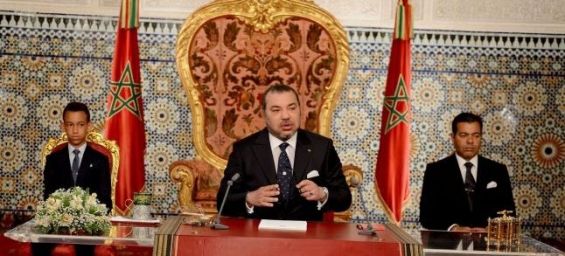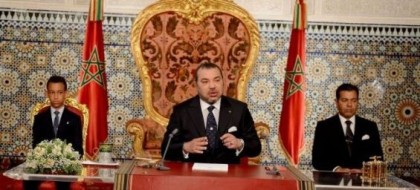
Morocco’s King renews commitment towards the underprivileged
 King Mohammed VI of Morocco has renewed commitment towards the underprivileged and marginalized populations that still live in dire conditions despite all the development efforts exerted throughout the country and called for innovative solutions to snatch this category out of the grips of poverty.
King Mohammed VI of Morocco has renewed commitment towards the underprivileged and marginalized populations that still live in dire conditions despite all the development efforts exerted throughout the country and called for innovative solutions to snatch this category out of the grips of poverty.
“All that has been achieved, no matter how significant it is, remains insufficient for our country, as long as there is a category of the population still living in dire conditions and feeling marginalized, notwithstanding what has already been done,” said the king in a speech on the occasion of Throne Day, commemorating this year the 16th anniversary of his coming to power after the death of his father, King Hassan II, in 1999.
“It is true that this category is getting smaller and smaller, but I want to see to it that all citizens benefit from the nation’s wealth. I pledged to work, for as long as I live, to achieve this goal and my ambition for the well-being of Moroccans has no limits,” he said.
In a most strikingly sincere commitment to the people’s well-being, he said, “all you experience in life is of interest to me: what hurts you affects me, and what makes you happy, rejoices me. Your worries are my top priorities.” “It makes me sad to see hardships endured by some of our fellow citizens in remote and isolated areas, in the Atlas and Rif mountains, in the desert and dry Saharan regions, in oases and in some coastal and inland villages,” he added.
Pointing out that all political and social reforms and all development initiatives are basically designed to preserve the dignity of citizens, the king stressed the need to “look for innovative solutions” that will enable the underprivileged layers of society to catch up with the well-to-do, as, he argued, “economic growth can only be significant if it contributes to improving people’s quality of life.”
To improve the living conditions of the populations still struggling with poverty, King Mohammed VI recalled that a comprehensive nationwide field study aimed at identifying the needs of every douar and every region in terms of infrastructure and basic social services, such as education, health, water, electricity, and rural roads has been conducted under the supervision of the Interior Minister, who is in charge of territorial communities.
The study covered more than 29,000 douars, under 1,272 local communities, all listed in a specific order of priority, he said, adding that around 20,800 projects worth about 50 billion Dirhams have been identified and that they target a population of more than 12 million people, living in some 24,000 douars.
To ensure the success of this ambitious social scheme, King Mohammed VI urged the Government “to develop an integrated plan of action, built on partnerships between all government agencies and the institutions concerned, with a view to providing funding for the projects and drawing up a precise timetable for their implementation.” He also urged the Government to attach more importance to social policies to raise the living standards of citizens not only in rural and remote areas but also in suburbs and slums in urban areas.
Touching on regionalization, the King said the regionalization model sought by his country “must be the outcome of serious endeavors to find appropriate solutions for each region, adapted to its resources, characteristics, potential employment opportunities and development challenges.”
